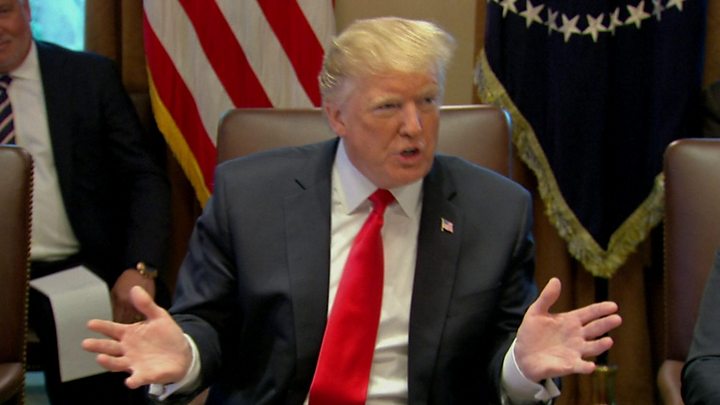President Trump's remarks at his cabinet meeting this week offered a bizarre glimpse into his perception of the world.
This is a president who, for all his bombastic self-promotion, is feeling the pressure.
His response was to provide an extended riff on his presidency and his achievements. But almost everything he said was questionable or, to put it bluntly, down-right wrong.
The Washington Post newspaper described it as "a 95-minute stream-of-consciousness..…..filled with falsehoods, revisionist history and self-aggrandizement".
Perhaps most indicative of Mr Trump's extraordinary view of geo-politics and contemporary history were his comments on the Soviet Union and its role in Afghanistan.
For a start he claimed that Moscow had been right to intervene there because terrorists were going into Russia.
This is of course not only untrue but at variance with the US' settled position which opposed the Soviet intervention.
The Russians actually moved in to help prop up a friendly regime. In December 1979 Soviet forces seized Kabul to try to bolster the communist government there, installing a new leadership more loyal to Moscow.
Then Mr Trump said that it was the set-backs in Afghanistan that had essentially destroyed the Soviet Union.
Afghanistan, he insisted, bankrupted the USSR. Now, the desperate war in Afghanistan certainly did much to tarnish the Soviet Union's reputation.
But US support for Afghan fighters also played a significant part in humbling the Russian military machine.
Russia's wider economic problems were due to falling oil prices; the pressures of keeping up with the US in the Cold War; and the impact of a partial liberalisation of the economy.
Mr Trump seemed to be wanting his audience to read in "the US" for the Soviet Union.
In other words, he saw the Soviet Union's experience as a cautionary tale underscoring his case for a US withdrawal from both Afghanistan and Syria.
Whatever the merits or otherwise of these two US deployments, the comparison with the Soviet Union's experience is bad history.
Mr Trump was also dismissive of his former Defence Secretary General James Mattis who remains, for many experts and service personnel alike, a hugely respected figure.
He had done a lot for Mr Mattis, Mr Trump said, getting the Pentagon a significant slice of additional money. "But what's he done for me ?" he asked.
He described his defence secretary's performance in Afghanistan as "not too good", asserting he was "not happy" with what he'd done there.
He then claimed he had "essentially" fired him.
Here you see a microcosm of the Trump approach. All relationships, whether between individuals or between nations, are transactional in nature.
I do this for you, you do something for me.
Given that long-standing US policy in Afghanistan is that the war cannot be won by military means and that the essential function of US support for the Afghan security forces is to make clear to the Taliban insurgents that they cannot win either, it is hard to see where Mr Mattis went wrong.
He was not fired, he resigned, issuing an eloquent, albeit barbed, letter to the president making clear his profound policy disagreements with Mr Trump.
Obfuscation is another element of the Trump approach.
General Mattis differed most profoundly with the president on the decision to withdraw US ground forces from Syria.
Since his resignation reports have suggested that there has been a partial re-think and the withdrawal will not proceed at the break-neck speed Mr Trump once intended.
But in his cabinet meeting he gave no clarity on current US policy. "I never said fast or slow" insisted the president.
He dismissed Syria as being of little importance - "we're talking about sand and death" he said, "we're not talking about vast wealth." But of Washington's wider strategic interests in the region not a word.
Then there was Mr Trump's apparent dismissal of soft power as an element in a country's foreign policy toolbox.
His view was highlighted in an aside about India and its role in Afghanistan.
India's Prime Minister Narendra Modi had apparently told him that his country had constructed a library in Afghanistan.
"I don't know who's using it", quipped Mr Trump, "but I don't like being taken advantage of."
 Media playback is unsupported on your device
Media playback is unsupported on your device
An Indian Government spokesman has responded by noting the "critical role that developmental assistance can play in transforming human lives".
This was a sobering performance from Mr Trump as his presidency enters a new and critical phase.
Also apparent from the televised meeting was that nobody sought to intervene to correct the president's historical analysis.
It is a measure of the impact of the departure of the so-called "grown-ups in the room"; the trio of Rex Tillerson at State; James Mattis at the Pentagon; and General John Kelly as White House Chief of Staff.
Even the current National Security Adviser John Bolton looked to say the least, uncomfortable, as the president set out his case.
Mr Trump's erratic behaviour along with his incontinent tweeting have fast become the "new normal".
But this cabinet session was a reminder of just how extraordinary the "new normal" really is.
Source: bbc.com


Comments